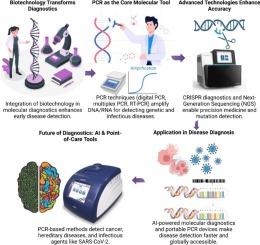将生物技术整合到诊断实验室:PCR和分子程序的创新
IF 4
Q2 BIOTECHNOLOGY & APPLIED MICROBIOLOGY
引用次数: 0
摘要
生物技术领域极大地促进了诊断实验室的进展,特别是在遗传疾病的早期鉴定方面。及时发现在治疗和管理这些疾病中起着至关重要的作用,并且已经建立了许多分子方法来准确和敏感地识别疾病标志物。聚合酶链反应(PCR)是分子生物学的基础技术,已经取得了各种进展,使其成为识别遗传异常诊断环境中的基本方法。基于聚合酶链反应(pcr)的方法通过扩增微量DNA,从而改变了诊断过程,从而可以识别与多种遗传疾病相关的突变。这篇综述探讨了生物技术在诊断实验室中的作用,强调通过分子程序检测遗传病。特别关注PCR的创新,强调新的基于PCR的技术,如数字PCR,多重PCR和反转录PCR,这些技术提高了灵敏度和多功能性。此外,各种PCR方法,他们的诊断应用和固有的局限性进行了讨论。分子工具在识别疾病,如癌症,遗传性疾病和感染性感染的作用也进行了探讨。这篇综述进一步概述了PCR技术的发展,它们与分子诊断的结合,以及它们在提高诊断准确性和实现疾病早期检测方面的潜力。PCR技术的不断进步正在改变诊断实践,使分子检测更准确、更快速、更容易获得。这些创新承诺加强疾病管理和更好的临床结果,预示着医疗保健的新时代。本文章由计算机程序翻译,如有差异,请以英文原文为准。

Integrating biotechnology into diagnostic labs: Innovations in PCR and molecular procedures
The field of biotechnology has significantly contributed to progress in diagnostic laboratories, especially in the early identification of genetic disorders. Timely detection plays a vital role in the treatment and management of such conditions, and numerous molecular approaches have been established to identify disease markers with high accuracy and sensitivity. The polymerase chain reaction (PCR), a cornerstone technique in molecular biology, has seen various advancements, establishing it as an essential method in diagnostic settings for recognizing genetic abnormalities. PCR-based approaches have transformed the diagnostic process by amplifying trace amounts of DNA, allowing for the identification of mutations linked to a wide range of inherited conditions. This review explores the role of biotechnology in diagnostic labs, emphasizing genetic disease detection through molecular procedures. Special attention is given to innovations in PCR, highlighting new PCR-based techniques such as digital PCR, multiplex PCR, and reverse-transcription PCR, which have improved sensitivity and versatility. Additionally, various PCR methodologies, their diagnostic applications, and inherent limitations are discussed. The role of molecular tools in identifying diseases such as cancer, hereditary disorders, and infectious infections is also explored. The review further outlines the evolution of PCR technologies, their integration into molecular diagnostics, and their potential to improve diagnostic accuracy and enable early disease detection. Ongoing advancements in PCR technologies are transforming diagnostic practices by enabling more accurate, faster, and widely accessible molecular testing. These innovations promise enhanced disease management and better clinical outcomes, heralding a new era in healthcare.
求助全文
通过发布文献求助,成功后即可免费获取论文全文。
去求助
来源期刊

Current Research in Biotechnology
Biochemistry, Genetics and Molecular Biology-Biotechnology
CiteScore
6.70
自引率
3.60%
发文量
50
审稿时长
38 days
期刊介绍:
Current Research in Biotechnology (CRBIOT) is a new primary research, gold open access journal from Elsevier. CRBIOT publishes original papers, reviews, and short communications (including viewpoints and perspectives) resulting from research in biotechnology and biotech-associated disciplines.
Current Research in Biotechnology is a peer-reviewed gold open access (OA) journal and upon acceptance all articles are permanently and freely available. It is a companion to the highly regarded review journal Current Opinion in Biotechnology (2018 CiteScore 8.450) and is part of the Current Opinion and Research (CO+RE) suite of journals. All CO+RE journals leverage the Current Opinion legacy-of editorial excellence, high-impact, and global reach-to ensure they are a widely read resource that is integral to scientists' workflow.
 求助内容:
求助内容: 应助结果提醒方式:
应助结果提醒方式:


